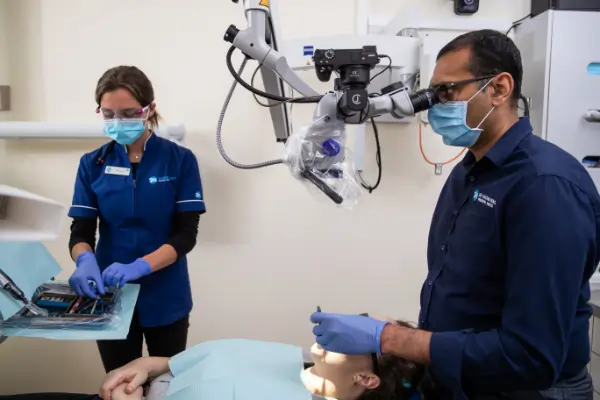Key Takeaways
- Seek recommendations from trusted personal and professional sources to get honest feedback.
- Review credentials, affiliations, and licensure thoroughly to confirm legitimacy and expertise.
- Assess the dental office environment, staff, and accessibility to ensure a comfortable and accommodating experience.
- Understand that regular dental care impacts both oral health and overall wellness, preventing future issues.
Introduction
Choosing the right dentist is essential for your long-term oral health and overall well-being. From skill and professionalism to convenience and comfort level, your decision will have a significant impact on your dental care experience. A trustworthy dentist helps ensure every visit is positive, every treatment is clearly communicated, and each procedure is performed with your best interest in mind. If you’re looking to find a dentist in your plan, understanding what to look for will help you make an informed and confident choice for yourself and your family. The right dentist is your partner in oral health, advocating prevention, patient education, and safe, comfortable treatments.
With many dental options, choosing can be overwhelming. Narrow your choices by focusing on key qualities that match your needs, budget, and comfort. The ideal dentist delivers quality care, prioritizes safety and long-term health, communicates clearly, and keeps you comfortable while providing advice.
Stay updated on oral health trends, technology, and preventive strategies. A committed, well-educated dentist can offer modern treatments and adhere to the latest practices. Select someone dedicated to lifelong learning and providing excellent dental care.
Seek Recommendations from Trusted Sources
Ask people you trust—family members, friends, or colleagues—about their dental care experiences. Their insights are often candid, specific, and based on firsthand impressions, such as the dentist’s communication skills, chairside manner, and the level of comfort felt during visits. For another perspective, speak to your primary care physician or local pharmacists, as medical professionals often have knowledge of reputable dentists in your community. These recommendations usually reflect the reliability and integrity of a practice and can steer you away from providers with poor reputations. Personal recommendations often include detailed stories or specific examples of excellent—or disappointing—care, which can be far more informative than advertisements or online reviews alone. Taking the time to gather word-of-mouth referrals is a crucial first step that can save you time and prevent costly mistakes down the line.
Verify Credentials and Professional Affiliations
Before scheduling an appointment, check if the dentist holds a valid license in your state and verify their credentials through online registries or state dental boards. Professional memberships—such as with the American Dental Association (ADA)—are a sign that the dentist adheres to high industry standards and is committed to ongoing professional development. Dentists who participate in respected organizations stay up to date with the latest research, technologies, and best practices. State dental boards often offer online directories so you can ensure your dentist’s licensure and disciplinary record are in good standing. It is also wise to ask about a dentist’s continuing education: those regularly improving their skills demonstrate a true investment in their profession and in their patients’ health.

Evaluate the Dental Office Environment
Visiting the dental office is a practical step to get a feel for the space. A clean, organized, and welcoming environment typically reflects high standards of patient care and infection control, which is especially important in healthcare settings. Take note of how the staff treat you and each other; helpful, professional, and courteous staff contribute to a positive experience and can make a noticeable difference in your comfort. Look for modern equipment, adherence to sanitation protocols, and a calm atmosphere. Observe whether the office is child-friendly if you have or plan to bring children—this indicates that the staff is experienced in treating patients of all ages. Ask if they offer amenities such as blankets, televisions, or sedation options if dental anxiety is a concern. When the practice prioritizes cleanliness, organization, and patient comfort, you can feel confident that you are in the right hands.
Consider Accessibility and Convenience
Identify dentists with offices conveniently located near your home or workplace. Spending less time traveling to and from appointments makes it easier to keep up with recommended check-ups and cleanings. Pay attention to their office hours to ensure they align with your schedule, especially if you need early morning, evening, or weekend appointments. Look for practices with flexible scheduling and prompt response times—these factors are particularly important for families, busy adults, and anyone with an unpredictable routine. Practices that offer emergency appointments or have protocols for urgent care provide added peace of mind. Accessibility may also include physical accommodations for those with disabilities, language services for non-English speakers, or virtual consultations for convenience. All of these aspects combine to make dental care an easier, more manageable part of your routine.
Review Patient Feedback and Online Ratings
Browse online reviews to gather broader feedback from current and past patients. Look for patterns in feedback, such as consistently positive or negative comments about professionalism, office cleanliness, the friendliness of staff, wait times, or specific procedures. Make sure to use a discerning eye—consider only reviews from reputable platforms such as Google, Healthgrades, or your insurance network’s website, and cross-reference with other sources to avoid biased, fake, or misleading information. Reading several reviews helps you better understand what to expect in terms of appointment availability, billing processes, and the dentist’s expertise. If you notice recurring issues, such as billing confusion or long wait times, take these as red flags that may impact your experience as well.
Understand the Importance of Regular Dental Visits
Consistent dental check-ups are foundational for maintaining healthy teeth and gums. Dentists are trained to detect early signs of tooth decay, gum disease, or even oral cancer before they become severe or require complex treatment. Regular professional cleanings remove plaque and tartar that everyday brushing and flossing can’t address. Furthermore, numerous studies link poor oral health to systemic issues, such as cardiovascular disease, diabetes, and respiratory conditions, highlighting the importance of sustained dental care. By attending routine appointments, you can catch problems early, reduce anxiety about dental visits, and develop a positive, lasting relationship with your dental provider.
Assess the Range of Services Offered
A reputable dental provider should offer a wide array of services, including preventive care such as cleanings, exams, and sealants; restorative dentistry, like fillings, crowns, and root canals; cosmetic options, like whitening or veneers; and emergency dental care for sudden issues. A diverse service menu means you can address most oral health needs in one place, ensuring both continuity of care and familiarity with your dental history. Dentists who provide a comprehensive range of services are better equipped to tailor care for you and your family, no matter your age or specific needs. Ask about specialty areas—such as pediatric, orthodontic, or gum treatments—so you know whether referrals to outside providers will be necessary for specialized procedures.
Inquire About Payment Options and Insurance
Dental care can be costly, so discuss payment plans, insurance, and financing before choosing a practice. Have the office explain their billing process and check insurance acceptance. Knowing payment responsibilities upfront avoids surprises and coverage gaps. Transparent costs and flexible options like membership plans, third-party financing, or discounts for upfront payments help budget care. Some offices also assist with insurance claims and explaining benefits, easing the process for those unfamiliar with dental paperwork. Evaluating these factors helps you select a dentist that fits your needs, fostering a positive relationship and encouraging proactive oral health for you and your family.
Conclusion
Finding a trustworthy dentist is essential for maintaining your oral health and ensuring a positive dental care experience. By carefully evaluating credentials, seeking recommendations, reviewing patient feedback, and assessing communication style and clinic environment, you can confidently select a professional who meets your needs. Prioritizing trust and comfort will not only help you build a long-term patient-dentist relationship but also support better overall dental outcomes for years to come.

